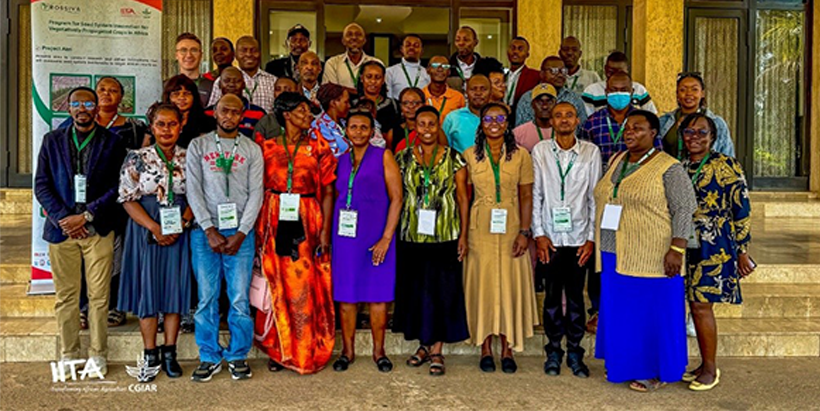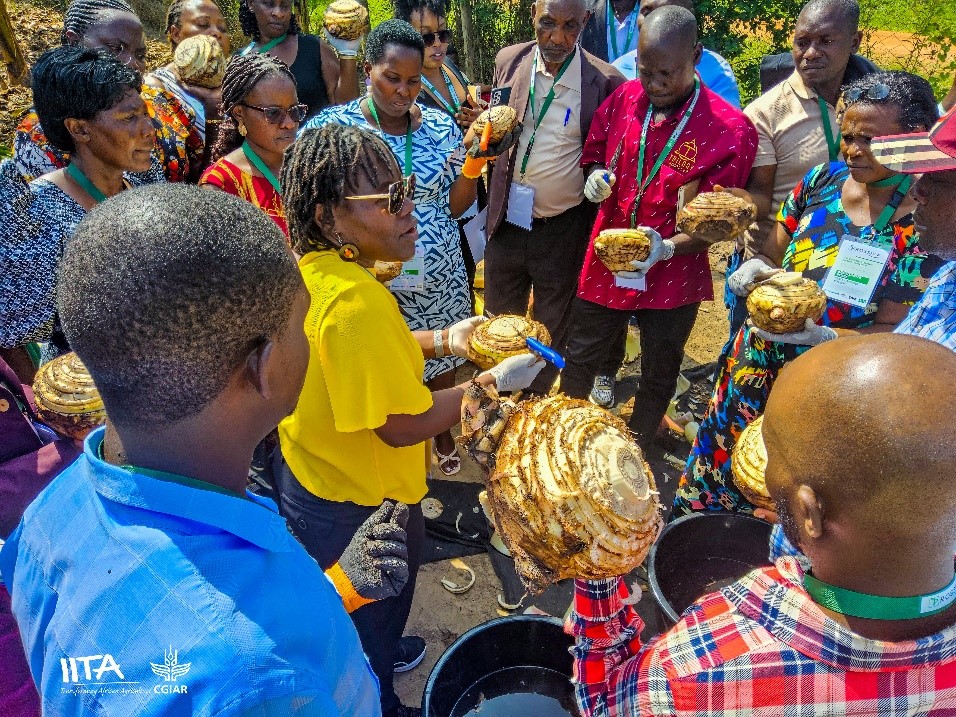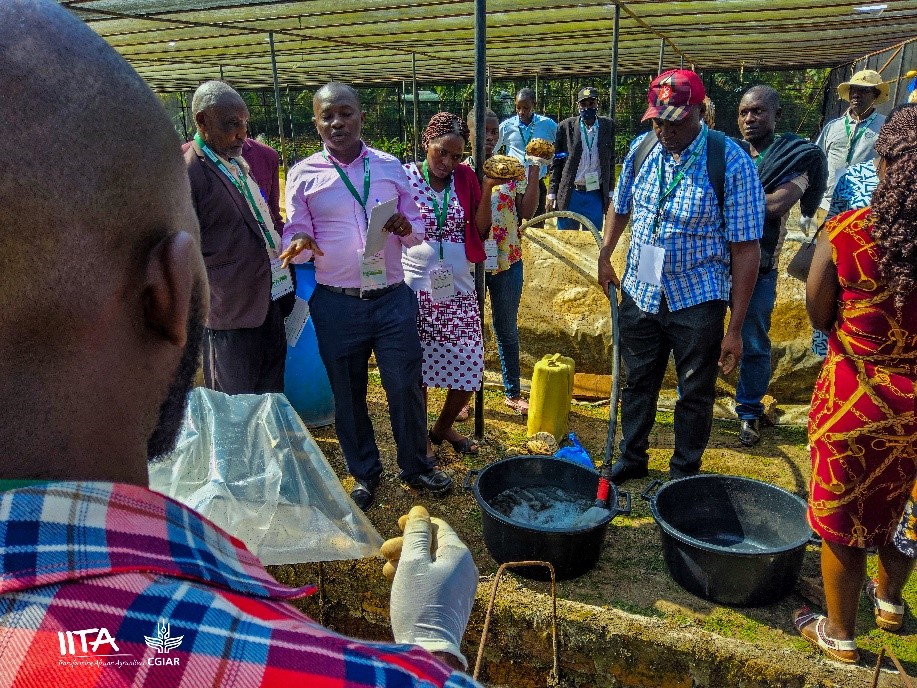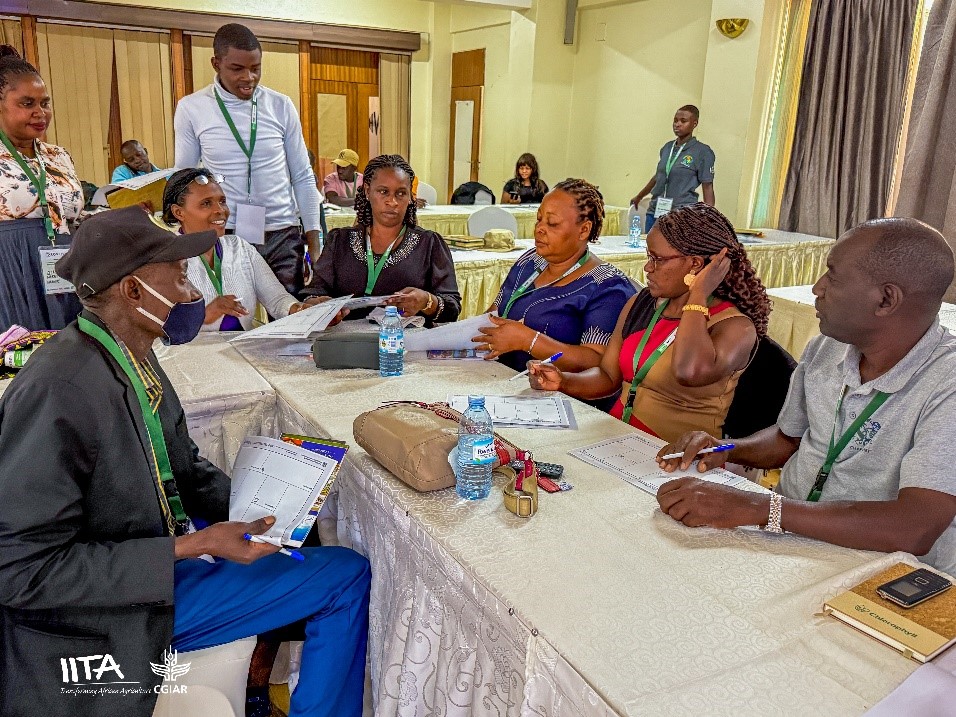Banana is a staple crop in Uganda, providing millions of people with food, income, and employment. Despite its production potential exceeding 70 tons per hectare per year, the sector faces significant challenges, including pests and diseases, poor soil fertility, limited access to high-quality planting materials, and drought, resulting in actual yields remaining around 30% of its potential. While quality disease-free planting materials are crucial for improving banana productivity and reducing pests and diseases, many Ugandan farmers still depend on informal seed systems, which unfortunately often lead to spreading infectious pests in their fields.
To address the challenges, IITA–CGIAR in collaboration with the National Agricultural Research Organisation (NARO) and Resourced through the Gates Foundation funded project ‘Program for Seed System Innovation for Vegetatively Propagated Crops (VPCs) in Africa (PROSSIVA)’ recently organized a three-day (25 to 27 June 2025) Banana Seed Enterprise Advisory Workshop to strengthen banana seed systems and empower grassroots seed entrepreneurs. The workshop brought together 28 banana seed actors from 12 seed enterprises in Mbarara, Uganda, to enhance their technical, business, and marketing skills. The training featured technical aspects of the seed system and business development sessions facilitated by IITA, NARO, MAAIF, 5DM/Chlorophyll, and ShambaBox. Notably, this was the first time macropropagation seed actors were brought together for training and interactions with research, regulators, and marketing experts to strengthen seed enterprise development to ensure sustainable availability of high-quality seed in Uganda. However, Uganda is the second country in the region to host this impactful training, following a successful similar initiative in Tanzania.
Producing clean banana seeds
Dr Delphine Amah, PROSSIVA Coordinator and IITA banana breeder, trained participants on banana seed production using macropropagation technology. She emphasized the critical role of clean planting materials in preventing yield losses, noting that “Banana seed production begins with suckers, which can be a key source of infection, significantly reducing yields in plantations. Seed producers must start with clean, disease-free tissue culture plants to establish ‘mother gardens’ and use macropropagation with good sanitation practices to produce high-quality planting materials for farmers.” Building on this, the seed actors were introduced to the benefits of macropropagation, such as higher multiplication ratios (1:20-100 in 4-6 months), relatively clean and uniform planting material, and faster establishment, ultimately boosting banana yields by up to 100%.
Participants also had hands-on practical sessions at the Mbarara District Farmers Association (MBADIFA) nursery, learning about banana nursery establishment and macropropagation techniques, including sucker selection for macropropagation, sucker paring, sanitation practices, substrate preparation, chamber filling with substrates, sucker planting, propagator management, seedling harvesting, potting, and hardening. This was aimed at empowering them to produce high-quality banana planting material.
By adopting these cutting-edge banana seed production techniques, seed producers can significantly increase production outputs, ensure profitability, and sustainably deliver high-quality seeds to farmers for improved banana yields. Seed producers will also serve as efficient channels for delivering seeds of newly improved varieties to farmers.
Banana seed access, regulatory framework, and certification procedures
Regarding seed regulatory framework and access, NARO and the Ministry of Agriculture, Animal Industry and Fisheries (MAAIF) shared valuable insights, where Isaac Wamatsembe, a Senior Agricultural Inspector from MAAIF, highlighted the critical role of the National Seed Certification Services (NSCS) in ensuring high-quality, disease-free planting materials reach farmers. “Compliance with the seed law is mandatory. Seed producers should take proactive steps to understand the regulatory requirements and work closely with inspectors to ensure full compliance,” he said.
Isaac also highlighted the importance of seed certification in providing farmers with confidence in the seeds they purchase, enabling traceability, and ensuring easy selling of seeds for seed growers. In addition, Dr Allan Waniale and Dr Rockefeller Erima from NARO assured the seed entrepreneurs of the accessibility and affordability of the high-quality banana improved varieties from NARO, the entrusted source for high-quality foundation seed in the country. “You can get the clean seeds between UGX 3,000 to 5,000 ($ 0.81 – $ 1.35) per plant,” Dr Allan said.
Business development and marketing strategies for growth
During the business development session, Seth Charles Mkisi from Shamba Box trained on developing a profitable and sustainable seed enterprise, emphasizing the importance of understanding customer needs, building strong value propositions, and choosing the right distribution channels. Using the Business Model Canvas, he guided participants through essential components such as cost structure, revenue streams, and record-keeping, highlighting their critical role in making agribusiness productive and profitable.
“By focusing on accurate record keeping, businesses can improve decision-making, ensure financial stability, and access funding opportunities,” Seth noted.
Nzilani Muya and Fathiya Accram from Chlorophyll shared knowledge on branding and marketing strategies tailored to the banana seed sector. They emphasized that a strong brand identity is crucial for building trust and recognition in the market. By crafting a compelling brand story that resonates with farmers, seed businesses can differentiate themselves from competitors and establish a loyal customer base. “Clear and localized messaging is important because farmers don’t just buy products, they buy stories they connect with. By using short, clear messages in accessible language, businesses can engage customers and drive sales,” Fathiya emphasized.
The participants commended the workshop’s knowledge, noting their readiness to improve their nursery operations and contribute to the growth of the seed industry in Uganda. “I now have a full grasp of the seed value chain from sourcing varieties to delivering to farmers,” said Haruna Mutaawe, from the Farm Care Unit, Masaka. “The training was comprehensive, and I am confident I can apply the skills and knowledge gained to improve my business.”
Solomy Bakashaba, from Forest Friends, Rwampara, noted, “The training was encouraging, and I feel empowered to expand my nursery operations. I now know how to position my nursery better in the local market and engage with customers effectively.”
To ensure farmers have access to high-quality cooking banana improved varieties, IITA and NARO have developed and released several improved banana hybrids, including NAROBAN 1–6 and KABANA 1-7. These hybrids are resistant to major pests and diseases, exhibit higher yields, and are more consumer-acceptable. One notable example is NARITA 17, a new matooke hybrid released in 2025.
Contributed by Moureen Awori, Francis Okot, Delphine Amah, and Gloriana Ndibalema








No Comments